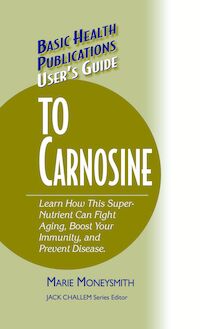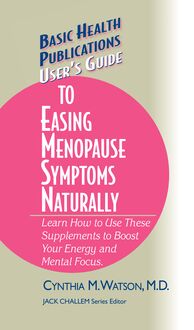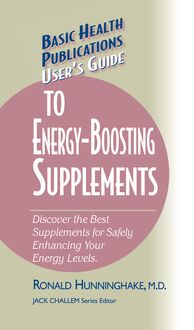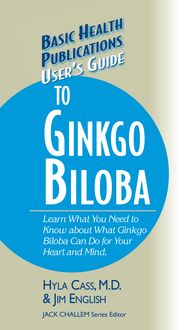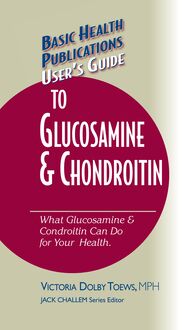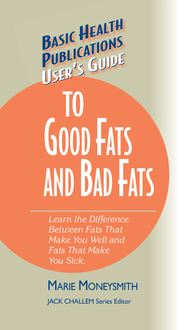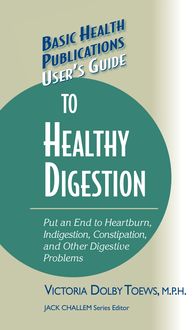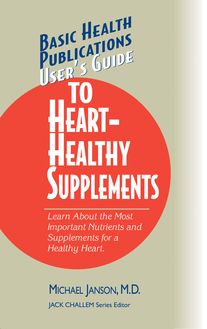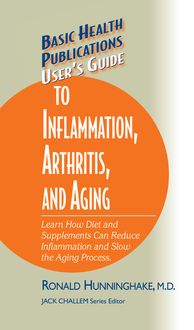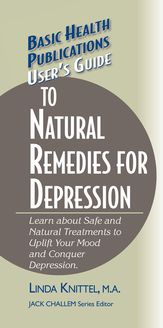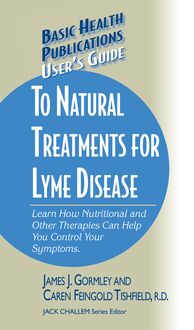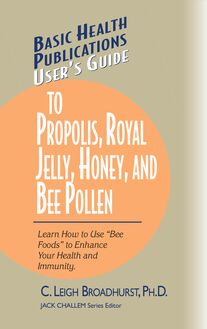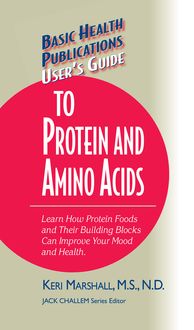-
 Univers
Univers
-
 Ebooks
Ebooks
-
 Livres audio
Livres audio
-
 Presse
Presse
-
 Podcasts
Podcasts
-
 BD
BD
-
 Documents
Documents
-
- Cours
- Révisions
- Ressources pédagogiques
- Sciences de l’éducation
- Manuels scolaires
- Langues
- Travaux de classe
- Annales de BEP
- Etudes supérieures
- Maternelle et primaire
- Fiches de lecture
- Orientation scolaire
- Méthodologie
- Corrigés de devoir
- Annales d’examens et concours
- Annales du bac
- Annales du brevet
- Rapports de stage
La lecture à portée de main
Vous pourrez modifier la taille du texte de cet ouvrage
Découvre YouScribe en t'inscrivant gratuitement
Je m'inscrisDécouvre YouScribe en t'inscrivant gratuitement
Je m'inscrisEn savoir plus
Vous pourrez modifier la taille du texte de cet ouvrage
En savoir plus

Description
Written by leading experts and science writers, The User's Guide to Nutritional Supplements Series covers a range of popular alternative medicine and health issues, including specific major diseases, alternative therapies, and vitamins, minerals, herbs, and other nutritional supplements.
The User's Guide to St. John's Wort describes the herb's traditional uses and the remarkable science demonstrating its benefits in treating depression.
Sujets
Informations
| Publié par | Turner Publishing Company |
| Date de parution | 01 janvier 2003 |
| Nombre de lectures | 0 |
| EAN13 | 9781591206033 |
| Langue | English |
| Poids de l'ouvrage | 1 Mo |
Informations légales : prix de location à la page 0,0298€. Cette information est donnée uniquement à titre indicatif conformément à la législation en vigueur.
Extrait
The information contained in this book is based upon the research and personal and professional experiences of the author. It is not intended as a substitute for consulting with your physician or other health care provider. Any attempt to diagnose and treat an illness should be done under the direction of a health care professional.
The publisher does not advocate the use of any particular health care protocol but believes the information in this book should be available to the public. The publisher and author are not responsible for any adverse effects or consequences resulting from the use of the suggestions, preparations, or procedures discussed in this book. Should the reader have any questions concerning the appropriateness of any procedures or preparation mentioned, the author and the publisher strongly suggest consulting a professional health care advisor.
Series Editor: Jack Challem
Editor: Carol Rosenberg
Typesetter: Gary A. Rosenberg
Series Cover Designer: Mike Stromberg
Basic Health Publications User’s Guides are published by Basic Health Publications, Inc.
8200 Boulevard East
North Bergen, NJ 07047
1-800-575-8890
Copyright © 2002 by Laurel Vukovic
ISBN-13: 978-1-59120-603-3
ISBN: 1-59120-006-7
All rights reserved. No part of this publication may be reproduced, stored in a retrieval system, or transmitted, in any form or by any means, electronic, mechanical, photocopying, recording, or otherwise, without the prior written consent of the copyright owner.
Printed in the United States of America
10 9 8 7 6 5 4 3 2 1
C ONTENTS
Introduction
1. So You’re Curious about St. John’s Wort
2. Understanding and Diagnosing Depression
3. Who Suffers from Depression?
4. Are You Depressed? A Simple Self-Test
5. Conventional Treatments for Depression
6. How St. John's Wort Can Help You
7. Scientific Support for St. John’s Wort
8. Alleviate Depression with Diet and Exercise
9. A Holistic Approach to Depression
10. Safety and Precautions
11. How to Buy and Use St. John’s Wort
Selected References
Other Books and Resources
I NTRODUCTION
E veryone suffers from passing moods. True, it doesn’t feel good to be sad, blue, or down-in-the-dumps, but changing emotions are a part of what makes us human. It’s not realistic to expect to always be happy, or to always feel good. Feelings of sadness and loss are a normal part of life.
However, severe or persistent feelings of sadness or hopelessness erode well-being and significantly interfere with the enjoyment of daily life and the ability to function normally. According to the World Health Organization, major depression is the leading cause of disability in the United States and throughout the rest of the world. The National Institute of Mental Health reports the sobering fact that approximately 17 million American adults suffer from depression each year—more than are stricken with cancer or heart disease.
Fortunately, depressive disorders are highly treatable illnesses. Great strides have been made in recent decades in the physiological and psychological treatment of depression, including natural approaches to treating depressive disorders. By reading this book, you’ll gain an understanding of depression and the many things that you can do to alleviate these debilitating conditions.
In User’s Guide to St. John’s Wort , you’ll learn about depression and who it affects. You’ll find clear descriptions of the symptoms of depressive disorders, along with a simple self-test for depression. Most important, you will learn a great deal of information about effective treatments for depressive disorders. You’ll discover the pros and cons of the prescription drugs that are so commonly prescribed for treating depression, and you’ll gain a solid knowledge of the natural alternatives available. You’ll understand why one of the most highly regarded, well-researched, effective, and safe alternatives to prescription antidepressants is the herb St. John’s wort.
In this book, you’ll find in-depth and simple-to-understand answers to your questions about St. John’s wort. You’ll find out how to safely use St. John’s wort, and you’ll be informed about the most effective forms and dosages of this herb. There are many scientific studies that support the use of this valuable herb for the treatment of depression, and you’ll learn about some of these important studies in these pages.
First things first. Read on to discover more about exactly what St. John’s wort is, and how it has come to be a renowned herbal treatment for depression.
CHAPTER 1
S O Y OU’RE C URIOUS ABOUT S T. J OHN’S W ORT
I f you’re reading this book, you’ve most likely heard something about St. John’s wort. You’ve probably heard that it can help alleviate feelings of depression. And you might be wondering if St. John’s wort could be helpful for you or someone you know.
Perhaps you’ve been feeling blue lately or have struggled with depression for a long time. Or you might be feeling anxious and are having difficulty sleeping. You might even have tried antidepressant medications, but are unhappy with the side effects or would like to try a more natural approach.
If you are suffering from depression, St. John’s wort, an herb with a long history of use in the treatment of emotional distress, may be helpful for you. In a nutshell, it has been found to be most beneficial for people suffering from mild to moderate depression. It’s also been found to be helpful for alleviating anxiety and insomnia related to depression, and for depression related to premenstrual syndrome (PMS), menopause, and seasonal affective disorder (SAD).
What Is St. John’s Wort?
A perennial plant native to Europe, St. John’s wort ( Hypericum perforatum ) has naturalized and grows abundantly along roadsides and other sunny open spaces throughout North and South America, Asia, Africa, and Australia. It was most likely introduced to North America by early European colonists, and is now grown commercially because of its valuable medicinal properties.
St. John’s wort is a nondescript, weedy looking plant that is easy to overlook until mid-summer, when it bursts into a flush of tiny, bright yellow star-shaped flowers. The small, oval leaves are dotted with tiny perforations, hence the species name, perforatum.
If you crush a fresh flower bud, it will release a deep reddish purple oil. This substance is called hypericin, and is considered to be one of the primary active ingredients that gives St. John’s wort its healing properties.
Hypericin
A natural chemical compound found in St. John’s wort that is considered to be one of the herb’s primary active ingredients.
One theory as to the origin of the common name of the herb is that early Christians named St. John’s wort in honor of John the Baptist. The plant blooms around the time of St. John’s Day (June 24) and the herb was traditionally collected on this day, steeped in olive oil to release its blood-red color, and used as an anointing oil to symbolize the blood of the saint. The Latin botanical name Hypericum is derived from the Greek word yper , which means “upper,” and the word eikon , which means “image.” Early Greeks and Romans placed St. John’s wort in their homes above statues of their gods as a protection against evil spirits.
Historical Uses of St. John’s Wort
In ancient Europe, St. John’s wort was believed to have protective powers against the unseen forces of evil. In Greece and Rome, the herb was used for protection against sorcerer’s spells, and early Christians believed that St. John’s wort drove away evil spirits. It may be that the people who were considered to be possessed by evil spirits were actually suffering from mental illness and were helped by using St. John’s wort. By the time the colonists brought St. John’s wort to America, the herb had a reputation for being effective as an antidepressant and for topical wound healing.
Throughout more than 2,000 years of use as a healing herb, St. John’s wort has been valued for treating nerve injuries, inflammation, sciatica, ulcers, and burns. But the most compelling use that has brought St. John’s wort to the forefront of herbal medicine and the attention of millions of people was the confirmation of the herb’s remarkable effects as a natural antidepressant.
Since 1979, St. John’s wort has been the subject of more than two dozen rigorous, double-blind, controlled clinical studies. Most of these studies were conducted in Europe, which has a long history of using herbs as alternatives to drugs in the treatment of mental and physical diseases. These well-designed studies have shown that St. John’s wort is just as effective as pharmaceutical drugs for treating mild to moderate depression. As a result, St. John’s wort is one of the most prescribed treatments for mild to moderate cases of depression in Germany, and has become one of the top ten bestselling dietary supplements in the United States. In 1998, United States consumers purchased $170 million dollars worth of St. John’s wort.
St. John’s Wort—A Hidden Healer
Although St. John’s wort was known as a valuable healing herb for thousands of years, it’s only been within the past few years that the herb’s value has been fully recognized in the United States. That’s because herbal medicine, along with other forms of healing like homeopathy that are now considered “alternative medicine,” were edged out of popular use by the rise of the conventional medical establishment many decades ago.
From the mid-1800s through the 1930s, there were two primary schools of medicine practiced in the United States. The orthodox physicians (known as “regulars”) practiced conventional medicine, while the Eclectic physicians relied heavily on the use of herbs for healing, much as naturopathic physicians do today. With the discovery of pharmaceutical antibiotics, which appeared to work miracles, orthodox medicine gained a position of power in the Unit
-
 Univers
Univers
-
 Ebooks
Ebooks
-
 Livres audio
Livres audio
-
 Presse
Presse
-
 Podcasts
Podcasts
-
 BD
BD
-
 Documents
Documents
-
Jeunesse
-
Littérature
-
Ressources professionnelles
-
Santé et bien-être
-
Savoirs
-
Education
-
Loisirs et hobbies
-
Art, musique et cinéma
-
Actualité et débat de société
-
Jeunesse
-
Littérature
-
Ressources professionnelles
-
Santé et bien-être
-
Savoirs
-
Education
-
Loisirs et hobbies
-
Art, musique et cinéma
-
Actualité et débat de société
-
Actualités
-
Lifestyle
-
Presse jeunesse
-
Presse professionnelle
-
Pratique
-
Presse sportive
-
Presse internationale
-
Culture & Médias
-
Action et Aventures
-
Science-fiction et Fantasy
-
Société
-
Jeunesse
-
Littérature
-
Ressources professionnelles
-
Santé et bien-être
-
Savoirs
-
Education
-
Loisirs et hobbies
-
Art, musique et cinéma
-
Actualité et débat de société
- Cours
- Révisions
- Ressources pédagogiques
- Sciences de l’éducation
- Manuels scolaires
- Langues
- Travaux de classe
- Annales de BEP
- Etudes supérieures
- Maternelle et primaire
- Fiches de lecture
- Orientation scolaire
- Méthodologie
- Corrigés de devoir
- Annales d’examens et concours
- Annales du bac
- Annales du brevet
- Rapports de stage

